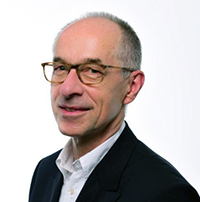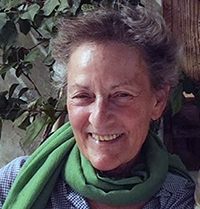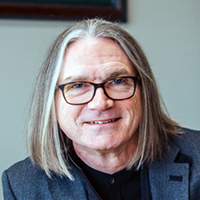IPA Webinar Behind the scenes of toxic polarisation: consequences of a divided world. Part 2
Date: January 5, 2024
Theme: Part 1 confirmed the relevance of toxic polarisation. This webinar will expand and deepen on how these phenomena occur in personal, social and institutional relationships in everyday life and psychoanalysis. In this webinar, our speakers will take up some reflections and ask two questions each to develop an exciting dialogue between them.
Speakers
 Heribert Blass (Germany)
Heribert Blass (Germany)
Training and Supervising Psychoanalysts for Adults, Children and Adolescents, also Specialist in Psychosomatic Medicine and Psychotherapy, Psychiatry. Member of the German Psychoanalytic Association (DPV) and the IPA. President of the European Psychoanalytic Federation (EPF). He works in private practice in Düsseldorf, Germany. IPA President-Elect.
Title: What do we mean today by the `Soft voice of the Intellect´ in the face of toxic polarisation?
One of the few points about which Freud was optimistic was his conviction that, in comparison to human instinctual life, the soft voice of the intellect would eventually be heard after a countless succession of rebuffs (1927, SE. 21:53). How can we as psychoanalysts understand and implement this astonishing optimism today? As the questions and comments after our first webinar show, this can only be done today by expanding the concept of 'intellect': Intellect means emotional understanding, and especially in the face of toxic polarizations, it seems all the more important to try to understand the emotional motivations behind polarized views and actions. Is it possible to empathize with the inner experience of an individual opponent or an opposing group? This is usually not possible. However, the psychoanalytic framework offers a unique opportunity to enable understanding of the other person's emotions and motives, whether in a one-to-one situation or in a group situation with the analyst not as a neutral third party but as a third party open to all participants. The soft voice of the intellect is working with one's own countertransference.
Dr. Blass Questions:
- What is the relationship between mortification and the experience of pleasure when holding on to toxic polarizations?
- What is the situation within international psychoanalysis: how can we find a balance between the ongoing search for common ground and the continuing recognition of cultural differences? Could this balance strengthen our competence to work in the community?
 Claudio Eizirik (Brazil)
Claudio Eizirik (Brazil)
Cláudio Laks Eizirik , MD, PhD , is a Training and Supervising Analyst, at Porto Alegre Psychoanalytic Society, Professor Emeritus of Psychiatry at
Cláudio Laks Eizirik , MD, PhD , is a Training and Supervising Analyst, at Porto Alegre Psychoanalytic Society, Professor Emeritus of Psychiatry at the Federal University of Rio Grande do Sul, Brazil, former President of IPA ( from 2005 to 2009) and FEPAL ( Latin American Psychoanalytic Federation), recipient of The Sigourney Award in 2011, with books, chapters and papers on analytic training, practice and institutions, and the relation of psychoanalysis and culture.
 Sue Kolod (USA)
Sue Kolod (USA)
Dr. Kolod is the President-elect of the North American Psychoanalytic Confederation (NAPsaC). She served on the Board of the IPA for 2 terms (2019 to 2023) and the Executive Committee as a representative from North America from 2021-2023. She is a Supervising and Training Analyst and member of the Faculty at the William Alanson White Institute and co-leads the Depolarization Project with Dr. Chris Heath. Dr. Kolod is also a member of the Board of Directors of APSA.
Title: What is Your Chosen Trauma?
Vamik Volkan defines “chosen trauma” as the shared mental representation of a massive trauma that the group's ancestors suffered at the hands of an enemy. When a large group regresses, its chosen trauma is reactivated in order to support the group's threatened identity. This reactivation may have dramatic and destructive consequences.
Understanding one’s chosen trauma is crucial in developing the capacity and curiosity to listen to opposing and disturbing views of the other. I will speak briefly about my own chosen trauma, how I became aware of it, and how acknowledging it helped me to listen to views I find abhorrent.
Dr. Kolod Questions:
- What is your chosen trauma and how has it shaped your most passionate and strongly held beliefs?
- Dialogue must have a purpose. What would be the purpose of engaging in dialogue with those in our field who hold diametrically opposed views that are difficult and painful to hear?
Moderator:
 A Chris Heath, MD (USA)
A Chris Heath, MD (USA)
Chair of External Communications at the International Psychoanalytical Association. Member of the Committee for Psychiatry and the Media of the Group for the Advancement of Psychiatry, a professionalism think tank in the United States. He was awarded a Video Grant from the Psychoanalytic Electronic Publishing Web (PEPWeb); his series "Mind Your Mind", explaining psychoanalysis in lay terms, is available on PEPWeb free of charge. He creates outreach videos on Tiktok at
https://www.tiktok.com/@achrisheathmd and YouTube at
http://www.youtube.com/c/FreudaliciousMind.